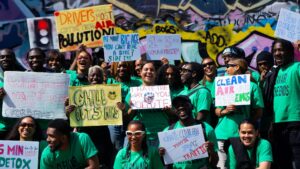Des Collins is best known for leading the Corby toxic waste case, a legal battle which was the first time atmospheric pollution had been linked to birth defects.
In 2009, after 10 years, the council were found to be negligent in transporting toxic waste through the town in open lorries. A finding that delivered long-awaited justice to the families affected.
The story has been brought back into public consciousness through the Netflix drama Toxic Town, which premiered earlier this year.
Interview by Features Editor, Emily Whitehouse
 What was your first point of contact with the mothers involved in the case?
What was your first point of contact with the mothers involved in the case?
The first point of contact with the mothers was as a result of my reading The Sunday Times. One of the investigative teams was up in Corby. I think they were actually looking at corruption with regard to the steelworks reclamation, which was rife at the time.
There was a lot of naughty things going on, and they became aware of a number of mothers who had given birth to children with both upper and lower limb defects, and they ran an article about it. I found the story interesting because I went to school in Corby and had worked at the Steelworks as a student for a short time.
I knew one of the journalists who had been involved in writing the article, so I phoned him up and said, “what do you know about this?” So he told me about it, and as a result, I was introduced to the mothers. It was really about being in the right place at the right time and knowing the right people.
Was there any hesitation in taking the case, given it was unprecedented territory linking atmospheric toxic waste to birth defects?
I did have a lot of hesitation accepting the instructions, but I found it interesting. A lot of people said to me, “you are absolutely crazy to embark on this, because it won’t go well.”
At the time, there was a film starring John Travolta based on a book called The Civil Action in which Travolta was a hugely successful trial lawyer who picks up a toxic waste case. I won’t bore you with the details, but at the end of the film he lost his practice because everything went completely wrong. A number of people told me to watch that film.
But I became involved in the issues regardless and it became something I had to succeed at. I remember saying to myself, “I won’t let this beat me.”
And not long after, Erin Brockovich came out and of course that was basically the same thing, only from a campaigners point of view rather than a lawyers, and Erin Brockovich was hugely successful, and she remains so as a campaigner.
This case has been compared to a ‘British Erin Brockovich’, and the two of you featured in an interview earlier this year, how does that comparison make you feel?
Embarrassed. Don’t forget, I was doing that case as a job – I’m a professional – but she was doing it as a campaigner. So yes, I’m embarrassed to be compared to her because she was doing it for possibly ‘better’ reasons, but the job had to be done.
How did you find Erin when you met her?
Fascinating. It’s quite nice to meet your heroes and find they’re actually as effective as they promise to be. She fulfilled everything I thought she would be, and I was grateful to have the experience.
Going back to the case, at what point did you feel confident enough that you could prove the link between the toxic waste and the birth defects?
If you want the facetious answer, it was about five seconds after the judgement came out.
We were never entirely confident. In addition to the Netflix production, BBC Horizon covered the story a few years ago, and they picked up the fact that shortly before the trial, I had to sit down with all the mothers and say “this is difficult, the chances are, as everyone predicts, we’re going to lose, so make sure you bear that in mind as we move forward to the trial process.”
So, shortly before the trial, we put proposals to the defendants which would have resulted in a settlement – and certainly not a particularly advantageous settlement, as far as the mothers were concerned – but it was a proposal put forward on the basis we thought our chances of winning were not as great as they might be. However, the counsel rejected it around four months before the trial started and we knew that we had no alternative but to go to court. You can’t say “well, hang on, you didn’t accept our proposals to settle, but why don’t we do this?”
We were running the case on a conditional fee basis, which meant we didn’t get paid unless we won. In order to protect the clients, we also had an insurance policy to cover any adverse costs that might be made if we lost, but of course, the way litigation works is some days you think you’re going to win it, and some days you think you’re going to lose it.
Although in this case there was nothing which went wrong in the sense that the evidence got worse. There was almost a sense of disbelief that the evidence had remained as strong as we believed it was. As we moved towards the trial, I remember saying “I can’t believe we’re going to get that lucky, because everyone says we’re going to lose. How can we possibly win?” It was a sudden loss of self-confidence.
When you win a trial, it feels easy to say, “we were always going to win, and the other side were always going to lose.” But, during the 12 weeks that the trial took place, one of my biggest worries was that even if we had done it properly, the counsel could have said “your science and your clinical examination of the issues is not good enough to establish liability.”
But what the counsel actually did was fight the whole thing. They put up a run of witnesses who were either independent professionals or people who had worked at the council to say, effectively, “we have done everything possible to do this properly and if it didn’t work out, it’s not our fault.”
Now, the mistake they made here was the judge we had, Mr. Justice Aitkenhead, was an expert in land reclamation and, in fact, had written a book on it as a youthful barrister. You could tell that every time they said something about how you should approach land reclamation, he didn’t quite – but virtually – put his head in his hands. You could see that he just couldn’t believe what they were saying.
In hindsight, the counsel should have cut those witnesses out and relied on the science, but they didn’t.

Rory Kinnear, playing the role of Des Collins, with Jodie Whittaker, playing one of the mothers
So, you could say you got lucky?
Yes, but that’s a common issue for lawyers who litigate: you can control the case until you walk through the door of the court, and after that, the control goes to the judge. And you never know what judge you’re going to get, but thankfully we got an excellent one.
Can you describe the atmosphere in the courtroom when the judge announced your victory?
Electric. But judgements like that are delivered to lawyers in paper, about three days before, so we can correct typos and things, so we knew. Now, if I was acting for you in a piece of litigation, and I had a judgement which affected you as a single person, I would be able to take you to one side and say, we’ve won this, but you can’t tell anyone else, because you’re in contempt of court.
When you’re acting for a number of people, you can’t do that, because it’s more likely to get out into the open and the judge gets very cross. So we were in the difficult position of being in court with all the mothers, and we knew what the outcome was for two days beforehand, but they didn’t. So that was slightly difficult, but it was electric, yes.
After the verdict was delivered, former Corby Council leader Kelvin Glendenning said: ‘I don’t think Corby Council has anything to regret’, you must have been seething with this response?
I think that approach by the council was typical and representative of the approach they took throughout the case. They always, I think, genuinely believed they had done nothing wrong. But there’s no point having a genuine belief if all the
expert opinion says, “actually, you did, it’s your fault, you did something wrong.”
But the council continued in that mode. After the judgement, they lodged an appeal and then, before the appeal was heard, they agreed a mediation which resulted in a settlement.
Though, as we completed the mediation the council were spreading rumours that if people didn’t get their dustbins emptied, for example, it’s because these mothers had taken all the money from the council. This also led to their children
being bullied at school.
How hard was it to keep those families believing that justice could be served for their children?
It was really difficult because it went on for ten years. And there were so many false dawns along the way where you thought the council might see sense, but every time we experienced a false dawn, it was proven to be just that.
The other issue was that the fact the council really believed they’d done nothing wrong. Eventually this did get to the mothers. And then I had to tell them that on the balance of probabilities they were going to lose the case.
For your own lawyer to say that to you after 10 years is an incredibly difficult thing to hear. But thankfully, that’s not the
way the case turned out.
Moving on from the case, I want to talk to about Toxic Town. At what point in the process where you told a TV series was being considered?
I was told about it fairly early on. The Horizon documentary was broadcast in 2020 and about two months after that, I got a call from someone who turned out to be one of the eventual producers of the TV series. She’d watched the BBC
documentary and thought it would make wonderful material for Netflix and asked if I wanted to be involved.
Of course, I agreed. I was involved but not on a day-to-daybasis, I had four or five meetings over a six-month period, just
chatting about the case rather than the production.
At one stage I was invited on set when they were shooting the final court scene, the idea was that I would have a short walk-on part, but I’d just had a knee replacement and couldn’t walk for about eight months, so I sadly couldn’t go.
Part 2 of this interview can be read here.
















Leave a Reply